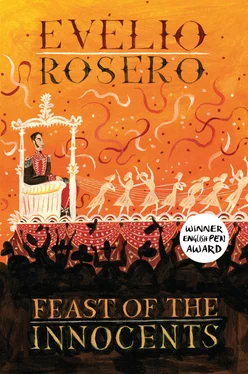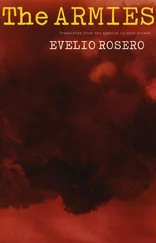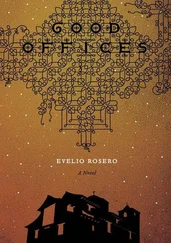“The three bullets hit the lady,” the watchboy gabbled. “One on the forehead, one on the bum and the other on one of her tits.”
Another guffaw. With a whistle, Maestro Umbría remembered it was Innocents’ Day, “Here’s to life!” he roared. Doctor Proceso did not want to interrupt the hullabaloo. All he saw, in front of him, was the colossal figure of the Liberator.
“Just like here today,” he said to himself, astounded, “Bolívar was never injured either, not once in his soldiering life, he always knew how to hide, he never showed his face.”
Well into the evening, the artisans took him home. They loaded him onto Martín Umbría’s truck — the one Bolívar was later to be fixed to for his procession. Even the children accompanied the doctor: Innocents’ Day overexcited them from the start. The adults proposed toasts at every corner and people out celebrating clambered up to soak them all, not just leaping into the back but also onto the running board beside the cab in which Zulia Iscuandé, Tulio Abril, the doctor in the middle and Martín Umbría — who was driving — were all drinking. Behind, on the open flatbed, the artisans and apprentices were fooling around, along with the horde of children who responded to each water attack with more water: they had a big earthenware jar full of bombs, which they hurled by the handful into the crowd. The clamour of the festivities swept over them from all sides: you could hear the din of water bombs exploding, crashing like boiling waves against the windscreen, the water like white lashes from a whip shooting over them, shouts like whistles — was that laughter or wailing? Heavy sighs, band music pulsing in the background, the traditional cries of “Viva Pasto, dammit!” from the revellers.
Right in the middle of the Avenida de los Estudiantes, at risk of being run over, a white-haired old man popped up, sitting astride a pregnant, squealing sow; delighted children urged them on at a run, and a fat woman, probably the pig’s owner, gave chase trying to catch them. A cow, completely soaked, was grazing terrified on one side of the Obelisk. Also soaked through like the cow, but happy, much more so than when he was a child and had joined in, Doctor Proceso got out of the vehicle at his lonely house, happy because he carried with him the maestros’ promise: they would create the Bolívar carnival float.
Long before the aguardiente , to prove their word as master craftsmen, the two maestros had climbed up onto the float and pulled down the devout Alcira, they toppled her bulk to the ground without hesitation; in her place they would put up the twelve girls pulling a victor’s chariot in which Bolívar would be seated with his Roman wreath on his head. And they themselves decided — to the doctor’s surprise — that around this carriage, on carved wooden panels, would go the key scenes of the War of Independence, which the doctor was to select: he would have to talk to Cangrejito Arbeláez about that, they suggested, one of Pasto’s best-known sculptors, who carved men and women and trees and animals as if breathing them into being. He was the only one who could triumph over the time left until the parade on January 6: exactly nine days.
With the maestros’ promise, Doctor Justo Pastor Proceso López said goodbye, reeling outside his house, drunk for the first time in years; it was some thirty since he had imbibed to the point of swaying about in such a fashion, but the cause was well worth the trouble, he thought, and he would not skimp: he would pay the artisans three times the float prize; he would not waste his time denouncing Furibundo, who was as rich as he was miserly — hadn’t he heard him swear he would charge the firemen for the six hens they drowned? Furibundo’s offer was a fabrication: he had wanted to trick and then startle the artisans, a ruse. The doctor would have to finance Bolívar’s carriage by himself. He was disheartened to recognize the fact that if the artisans agreed to support his idea it was purely and simply for money, three times the prize money of the winning float: why else would they work? — he said to himself — no other reason, don’t be naive, let’s not get carried away.
Because, when all’s said and done, who was he to set himself up as an expert on the true story of the Independence, and among artisans? There were nine days to go. Wouldn’t it be prudent to look for other allies? A float like the one in the offing could provoke resentment; it was Bolívar’s carriage, with his whole history on its back. He had to turn to his friends — to people who were his friends, years ago — but which ones? Doctor Proceso began to reflect on this, genuinely alarmed.
For now, he said to himself, finish the float, exhibit it on January 6, and more than that, let it exist in the world, as though memory were preserved on any corner of Pasto’s streets, the first bastion of the truth, of the real past. Something must come out of this float, something crucial, something definitive. Ah, he said to himself, if it could be exhibited permanently right in the middle of the children’s park, for the edification of infants and grandparents alike, but how would it be installed? What nook of the city would permit its permanent presence? For now, pay the craftsmen for its construction, guide the work; he would have to choose the scenes carefully — from among the many macabre events with which Bolívar’s life was full to overflowing.
He would sell his finca . He had been ready to do this for a long time: sell off those several, poorly managed acres of wheat, the ancestral but collapsing house, the abandoned sugar mill, the swimming pool with its missing tiles, the stables empty of livestock, the gardens empty of flowers — Primavera must be the only woman in the world, and poet to boot, who did not know flowers existed. One thing’s for sure, he thought, the frustrated poet would be delighted to get half the finca sale price in cash; she would not complain, she would immediately plan what clothes to buy, which shoes, where she would travel. But he would not stint on paying Maestro Abril what he deserved, nor Martín Umbría and the sculptor Cangrejito Arbeláez, and each and every one of the makers. They would understand later on what work they had created. Zulia Iscuandé had shown that sufficient memory still survived in Pasto. Bolívar’s carriage, the carriage of history, of legitimate rage, was imminent. No-one was going to stop it, no-one.
Then he sneezed.
“Provided I don’t die of a cold first,” he said, because he was dripping water, leaving a wet trail as he walked through his lonely house, empty of voices — not just the voices of his family, but his employees too: Sinfín was nowhere to be seen. He found her hurried note, written in a childish hand: We bought the chickins already Im going with the señora its midday now docter dont be long.
In the margin he discovered Primavera’s rounded writing and it scared away his drunkenness: I hope you’ll come to the birthday party and stay with your daughters at the finca, that’s if you remember, you ape.
Ape.
It was still not too late.
He drank a mug of black coffee and put on dry clothes. A one-hour journey to the finca , near Sandoná, lay before him; the hot weather there would cure his cold: he was not going to die.
But before setting off he made up his mind and telephoned the philosopher and professor Arcaín Chivo, a fifty-year-old like himself and a childhood friend, who asked, rather taken aback, whether the fact that he was calling meant the world was coming to an end. They had not spoken for years, not since their mutual interest in Simón Bolívar used to drive them to meet at the Guadalquivir café on Nariño Square and reconstruct the details, the bickering and backbiting, setbacks and apathies of Colombian independence. That was years ago now, when Arcaín Chivo was Professor of History; these days they just recognized one another every so often, from a distance: in Pasto’s only bookshop, or in the queue for one of the three cinemas, or on some corner — life slipping past as quickly as crossing the street.
Читать дальше












